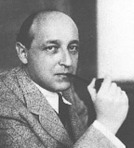Who Remembers Franz Neumann?
March 18, 2009
 I recently read the good news that Franz Neumann’s 1944 classic, Behemoth: The Structure and Practice of National Socialism 1933-1944, will finally be reprinted in English (by Ivan R. Dee Publishers). In a previous blog entry (German Lessons for Americans), I already commented on the importance of this work whose Harper Torchbook edition dates back to the 1960’s. Behemoth is required reading for anyone interested in trying to understand the phenomenon of National Socialism and certain of its homologous relations with the current political and economic situation in the Western world.
I recently read the good news that Franz Neumann’s 1944 classic, Behemoth: The Structure and Practice of National Socialism 1933-1944, will finally be reprinted in English (by Ivan R. Dee Publishers). In a previous blog entry (German Lessons for Americans), I already commented on the importance of this work whose Harper Torchbook edition dates back to the 1960’s. Behemoth is required reading for anyone interested in trying to understand the phenomenon of National Socialism and certain of its homologous relations with the current political and economic situation in the Western world.
I believe that in many respects we have more to learn from German thought of the period between the two World Wars than we have from what passes for philosophy and theory in our present time. There are certainly issues, for example those dealing with globalization and environmental concerns, that were less obtrusive in that period. Yet our understanding of fundamental economic and political concerns in the Occident can only be enhanced by the reading of Franz Neumann’s impressive study of National Socialism. (In this sense, there is a kind of parallelism with what I’ve previously written about the sciences. In a certain way, Neumann plays the same role here that Husserl played in my blog entry on philosophy and science.)
The euphoria in North America surrounding the election of a new president may very well lead to deception and disappointment. It is unlikely that the fundamental parameters of economic and political life will undergo radical modification once Western societies have weathered the current economic “correction”. Memories in North America are short. We tend to forget how far America has departed from its post World War II liberal capitalist course. If the Obama presidency succeeds in coming close to reversing some of the political and economic deviation of the Reagan years, it will have accomplished a major task. However, even such a reversal is not equivalent to structural change.
It is not my intention to examine Behemoth in detail: not only does the book contain a wealth of details on many aspects of the NS regime, but it also opens up many possible topics for detailed discussion. It demands a more systematic study. My intention is rather to make a few simple observations about certain aspects of the book.
The most important service that we obtain from Franz Neumann is the dissipation of many of the myths concerning the rise and practice of fascism in Germany. Post-structuralist acolytes have too often fostered the simpleminded dictum that Western rationalism leads directly to Auschwitz. Behemoth‘s strength lies in its detailed description of the situation in which National Socialism seized power and in its painstaking elaboration of the relations between power, politics and economics during its control of the German state. Neumann’s careful exegesis of the elements woven together in that complexity is exemplary.
It is possible to shortcut the description of the development of fascism by borrowing from Adorno/Horkheimer’s Dialectic of Enlightenment: in fascism Myth takes its revenge against Enlightenment. Or, to put this in Neumann’s terms, a rational state (say in the sense of Hegel) is not compatible with the (racial) movement state espoused by National Socialism. But Behemoth corrects the abstract character of this type of observation. Neumann shows that National Socialism had no real theory of society, no real philosophy beyond the promotion of a type of citizen activism that hardly left room for thought. Non-rational concepts derived from bogus racial theory and questionable geopolitical considerations were useful in hiding the real structure of power and in manipulating the masses (helped, of course, by the threat of terror). German society was structured by the dynamic of four groups (party, army, industry, bureaucracy), each organized according to the “leadership principle”. NS Germany was not really a state in any classical sense: it was not ruled by law, but rather by a series of technical rules whose foundation rested on a sort of arbitrariness. This is the sense in which Myth takes its revenge.
From my personal ethnic standpoint ( given that I am of Polish descent), it is somewhat chilling to read the details of the structure which was to govern a European continent ruled by National Socialism. Also, from the standpoint of someone who has been involved in education, it is particularly sad to read the disappointment that Neumann expresses in the “almost complete moral corruption of the German intelligentsia, especially of the academic world”. Even more damning to the educational system is his note that statistics showed that 23% of all party political functionaries came from the teaching professions, primarily from the ranks of elementary school teachers.
This sort of account echoes the description that Karl Löwith gives of his experience in the German universities of the time (in My Life in Germany Before and After 1933). Unfortunately, our experience with the character of academics since the Reagan years is not much different. Following years of flirtation with philosophical tendencies (commonly grouped under rubrics such as post-modernism or post-structuralism) most compatible with globalism (in the sense this term is used by Ulrich Beck) and least conducive to critical examination of the unfettered reign of transnational corporations, current philosophy has more or less loss its credibility, its moral authority and its critical function.
Finally, it is evident that the most crucial element in understanding the Germany of this period is the role of the cartels and the manner in which the cartellization of the German economy depended on totalitarian political power to help it avoid any perturbation. Neumann insists on the importance of the profit motive and the creation and maintenance of a political and social climate in which empire builders such as Flick, Wolff, Mannesmann, and Krupp could prosper. It was the role of National Socialism to provide the power necessary to support this monopolistic system. The aims of the German cartels could not be carried out in a political democracy. The accomplishments of the goals of German monopolistic capitalism demanded the state control of labor.
Imperialism was a product of this monopolistic capitalism, of industrial leadership backed by the NS controlled government. Strict control of raw materials markets, systematic dumping and currency manipulation were tools for the subjugation of foreign economies. Neumann claims that even the war itself can be partially viewed as resulting from a set of internal contradictions in the German economy.
Helmut Dubiel (in Theory and Politics) describes the assessment of the relation between fascism and capitalism as a point of division in the Frankfurt School of the years 1940-41. Neumann’s group ( Neumann, Marcuse, Kirchheimer, Gurland ), insisted on the primacy of the economic sphere, on the proposition that fascism is the form of political organization most appropriate to monopoly capitalism. The group consisting of Pollock, Adorno and Horkheimer, basing themselves on Pollock’s theory of state capitalism, believed that a developed fascist system , such as National Socialism, reversed the classical Marxist view by establishing complete political control over economic processes. Adorno and Horkheimer ‘s subsequent version of Critical Theory favored the thesis which considers domination in highly developed industrial societies as founded in more immediate political forms (see, for example, the well-known case of Adorno’s treatment of the Kulturindustrie).
It is certainly incontestable that the painstakingly rigorous and richly detailed analysis of NS in Behemoth is exemplary. It is a necessary task for philosophers and social theorists today to carefully analyze the homologies of our current situation with what prevailed in Germany in that epoch. As much as I was taken with Adorno and Horheimer’s elaboration of the dialectic between Reason and Myth and the realization that the very act of writing that text allows Reason to dialectically reposition itself against Myth, I am even more convinced that we now need to rely on philosophically guided analyses such as Behemoth to counteract the complacent and cynical position which substitutes narrative and cultural artifices for politics. By denigrating politics and refusing it a legitimate place in public life, by acquiescing in the control that economic power has accumulated, certain contemporary philosophical tendencies facilitate the return of fascism. The new appearance of Behemoth should remind us of what is at stake in today’s politics and remind theorists that it is time to revisit some basic questions about the relation of man, society and economy. 
Maybe my next question should be: who also remembers Karl Mannheim?